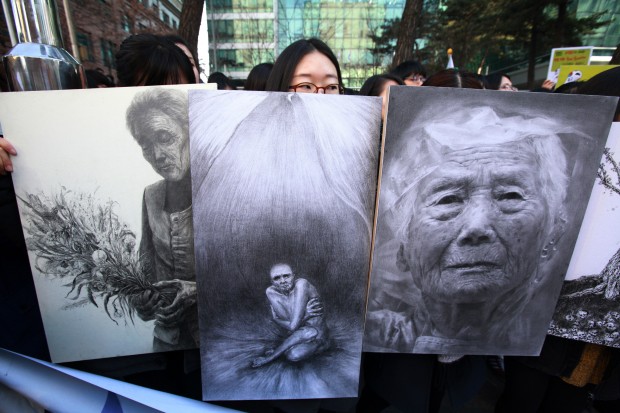Another former sex slave dies; 46 victims remain

Supporters of former South Korean comfort women, who were forced to serve for the Japanese Army as sex slaves during World War II, hold pictures during a rally against Japan’s revision on teaching manuals in Seoul, South Korea, Jan. 29, 2014. (Xinhua)
Choi Gap-sun, 96, a victim of the Japanese military’s sexual enslavement of women from Korea and other Asian nations, died on Saturday, according to a civic group.
With Choi’s death, the number of Korean survivors of sexual slavery during World War II has dropped to 46.
Including Choi, nine have died this year, according to the Korean Council for the Women Drafted for Military Sexual Slavery by Japan, a Seoul-based NGO.
Choi was born in Gurye, South Jeolla Province, in 1919.
When she was 15, she was taken to Japan by Japanese soldiers instead of her father, the eight-member family’s only bread-winner. Choi was the eldest child.
She was sent to the Mudan River in Manchuria and forced into sexual slavery until the end of the war.
After Korea was liberated from Japanese colonial rule in 1945, Choi returned to her hometown by walking for more than three years, living in destitution.
She then continued to work on the land.
Choi had been sick for several years, according to the council.
A memorial altar for her has been set up at Namyangju Hanyang General Hospital in Gyeonggi Province. The funeral will be today.
Only 46 Koreans are left of 238 victims registered with the government. The remaining women, mostly in their 80s and 90s, are in poor health.
“Time is running out for the surviving victims,” said a council official. “The Japanese government should make an official apology and provide compensation, the minimum measure to relieve the victims’ pain.”
The council and the victims began a protest rally in January 1992, and this has taken place every Wednesday in front of the Japanese Embassy in Seoul, the world’s longest-running demonstration about a single issue.
(This post originally appeared in The Korea Times)

























































